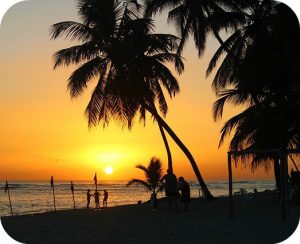 If you’re lucky enough to visit the beach this summer, you already know to bring plenty of sunscreen to protect yourself from any harmful rays. What you might not realize, however, is that some types of sunscreen can also damage the environment. As much as 70 percent of brands on the market contain the chemicals octinoxate or oxybenzone, described by the National Ocean Service as “highly toxic to juvenile corals and other marine life.”
If you’re lucky enough to visit the beach this summer, you already know to bring plenty of sunscreen to protect yourself from any harmful rays. What you might not realize, however, is that some types of sunscreen can also damage the environment. As much as 70 percent of brands on the market contain the chemicals octinoxate or oxybenzone, described by the National Ocean Service as “highly toxic to juvenile corals and other marine life.”
That’s bad news for places like Hawaii that not only cater to millions of beachgoers every year but also heavily depend on systems of natural reefs. Along with supplying shelter for sea creatures, the Smithsonian says that reefs also provide humans with an enormous amount of food, medication and tourism jobs. In fact, the financial value of Hawaii’s reefs ranges from $30 billion to $172 billion annually. So in order to protect its economically and environmentally vital reefs, Hawaii’s legislature recently passed a bill that restricts the sale of sunscreens containing octinoxate or oxybenzone. If the state’s governor signs the bill into law, then some of the most popular sunscreen brands will disappear from store shelves by the beginning of 2021.
Proponents of the legislation say that Hawaii could “set the gold standard for the world to follow” in terms of protecting natural reefs. On the other hand, companies that produce sunscreen aren’t nearly as happy about the bill. Bayer, which owns Coppertone, said in a statement that “eliminating the use of sunscreen ingredients considered to be safe and effective by the FDA with a long history of use not only restricts consumer choice, but is also at odds with skin cancer prevention efforts.” A trade group for the industry called the Consumer Healthcare Products Association agrees, claiming that “banning oxybenzone and octinoxate — key ingredients in effective sunscreens on the market — will drastically and unnecessarily reduce the selection of safe and effective sunscreen products available to residents and visitors.”
Questions:
- Should Hawaii place a ban on sunscreens that contain potentially toxic chemicals? Why or why not?
- If Hawaii’s governor signs this bill into law, do you think it will be helpful or harmful to consumers?
Sources: Lindsey Bever, “Hawaii Might Be About to Ban Your Favorite Sunscreen to Protect Its Coral Reefs,” The Washington Post, May 3, 2018; Jay Jones, “Choose the Right Sunscreen When You Visit Hawaii. Some Types May Soon Be Banned,” Los Angeles Times, May 9, 2018.
